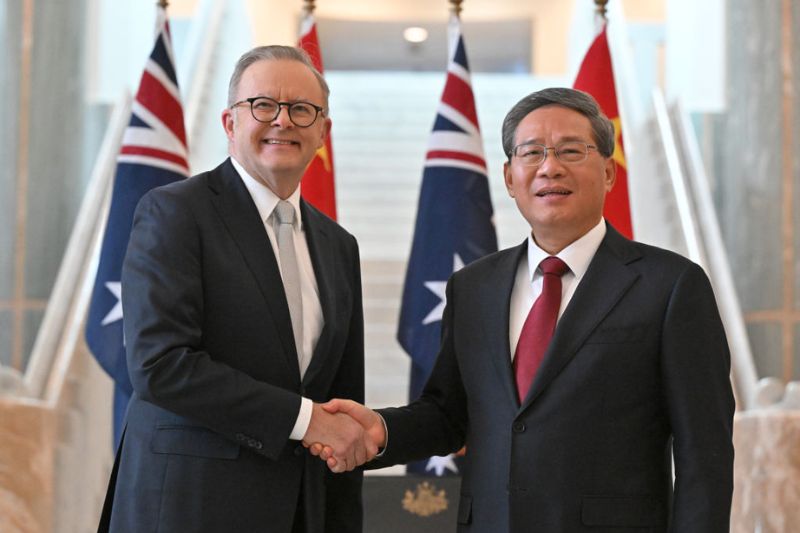In any sober analysis of the Sino-Australian game of diplomacy, the promise of two new replacement pandas easily trumps the whelps of a frustrated wolverine. These past days have seen the important continued stabilisation of the Australia-China relationship with the visit of China’s Premier Li Qiang, the first in 7 years. During the course of this four-day high-level delegation, Prime Minister Albanese greeted Premier Li in front of a 19-gun salute, a military guard of honour and an official luncheon in Parliament House, Canberra. Officials from both sides signed memoranda of understanding in such diverse areas as education and research, climate change, and areas concerning the China-Australia Free Trade Agreement.

Furthermore, while the Adelaide Zoo will return Wang Wang and Fu Ni — the two popular giant pandas it has cared for during a fifteen year lease — Premier Li promised that ‘we will provide a new pair of equally beautiful, lovely and adorable pandas to the Adelaide Zoo.’ Not all nations that have panda lease arrangements are treated as favourably, as the pandas are key indicators of the state of the relationship between the countries. For instance, as the relationship between the US and China deteriorated after President Obama’s announcement of the ‘Pacific Pivot’ in 2011, leases with US zoos were not renewed. The subsequent decade saw the return to China of giant pandas from San Diego Zoo, Memphis Zoo and National Zoo, although there has been a recent offer of pandas to San Diego this year, five years after they last hosted these magnificent animals.
The re-leasing of pandas to Adelaide was not a complete surprise, but the Chinese Premier also made the unexpected and strategic announcement that Australia would now be added to the list of nations that enjoy visa-free travel to China, some mere 14 in all. The presence of the Premier, the numerous memoranda, the resumption of Annual Leaders’ meetings, the recent lifting of most of the various trade tariffs, the panda diplomacy and the change in visa arrangements are all valuable positive steps forward. They also indicate very comprehensively that the un-necessarily fraught relationship of the past decade has continued to ameliorate, somewhat to the dismay of that group of China hawk politicians who dubbed themselves ‘wolverines.’ These politicians have sought to emphasise difference and contestation in the relationship between China and the rest of the world, initially focussing on the utterances of Chinese ‘wolf warriors’ diplomats, a reference to a 2015 nationalistic Chinese war movie of the same name.
One of the most outspoken of this group is shadow home affairs minister Senator James Paterson. Just prior to the Premier’s visit the Senator was quoted by the Sydney Morning Herald as stating ‘It’s up to the Prime Minister to explain how you have a stable relationship with an authoritarian power that is determined to threaten our infrastructure assets, interfere in our democracy and intimidate Australian citizens into silence.’
Prime Minister Albanese’s press conference after the State lunch saw him address the deeper concerns of maintaining and building a mature and stable relationship with any country. He asserted, ‘Our approach has … been patient, calibrated and deliberate. I've said repeatedly we will cooperate where we can, disagree where we must, but engage in our national interest, and that is in the interest of Australia and in the interest of China, as well as in the interest of regional stability.’ Or, put succinctly by the PM later in the same press conference, ‘dialogue is how we manage differences.’
This approach to bi-lateral relations is in stark contrast to the wolverines’ politicisation of encounters between Chinese and Australian officials and institutions, or what China’s Global Times amusingly termed the ‘previous strategy of using twisted microphone diplomacy to smear China.’ There are obviously numerous issues that need to be voiced by Australian leaders when engaging with their Chinese counterparts. Albanese provided a list of such issues in his press conference, including such things as foreign interference, issues in the Pacific, human rights and the case of Dr Yang Hengjun and his suspended death penalty. It would seem abundantly clear, however, that in order to voice these and any other issues it is important that there actually be a chance for conversation in the first place. The previous government’s approach effectively resulted in the inability of any minister to get a Chinese counterpart on the phone, which helps explain in part why it is that this most recent visit was the first high-level meeting in Australia for 7 years.
A new Confucian aphorism could well be ‘when a panda and a wolverine cannot speak to each other, is any dialogue even possible?’ For the sake of stable relationships, surely some dialogue is better than none at all.
Dr Jeremy Clarke, PhD is the Director of Sino-Immersions Pty Ltd and runs a wine bar and bookstore in Boorowa, NSW.
Main image: Chinese Premier Li Qiang shake hands with Australia's Prime Minister Anthony Albanese looks on at Australian Parliament House on June 17, 2024 in Canberra, Australia. (Photo by Mick Tsikas - Pool/Getty Images)